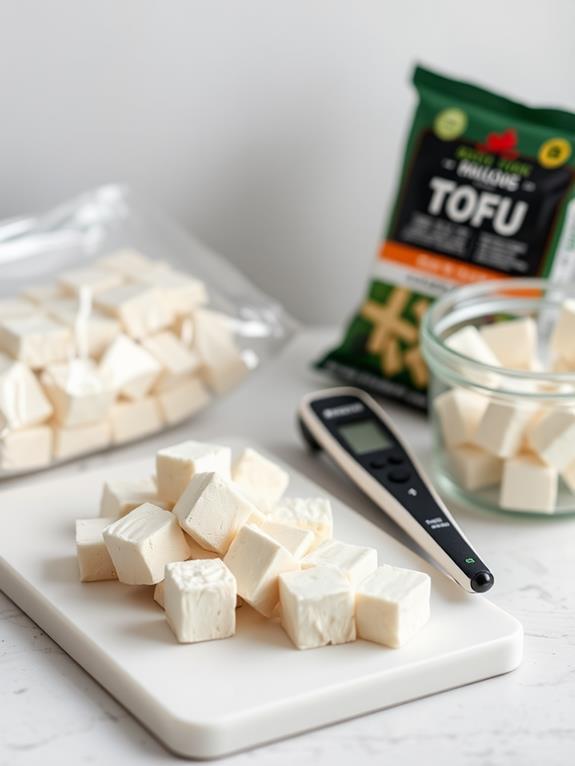Is It Safe to Eat Expired Tofu
Eating expired tofu can be safe, but it's not without risks. While unopened tofu can last 2-3 months past its expiration date if properly refrigerated, opened tofu should be used within 3-5 days. Always check for signs of spoilage like mold, discoloration, or a sour odor before consuming. Proper storage, including refrigeration and submerging opened tofu in water, can extend its shelf life. However, consuming expired tofu may lead to bacterial contamination and food poisoning symptoms. It's essential to prioritize freshness for peak health benefits and safety. If you're unsure about your tofu's quality, it's best to err on the side of caution. Understanding proper storage techniques can help you make informed decisions about tofu safety.
This post may contain affiliate links. If you make a purchase through these links, I may earn a commission at no additional cost to you. Additionally, portions of this post may be generated using artificial intelligence (AI) technology. While we strive for accuracy, please be aware that AI-generated content may not always be perfect and should be fact-checked when necessary.
The Spatula Scoops
- Tofu can be safely consumed 2-3 months past the expiration date if unopened and stored properly.
- Opened tofu should be used within 3-5 days for optimal safety, even if the expiration date hasn't passed.
- Always check for signs of spoilage like mold, discoloration, slimy texture, or foul odor before consuming expired tofu.
- Consuming expired tofu can lead to food poisoning symptoms such as stomach cramps, diarrhea, nausea, and vomiting.
- High cooking temperatures can kill potential bacteria in slightly expired tofu, but it's best to prioritize fresh products.
Understanding Tofu Expiration Dates

Understanding tofu expiration dates can be tricky, but it's essential for ensuring food safety and quality. When you're examining a package of tofu, you'll notice a "best by" or "use by" date. It's vital to understand that this date isn't a strict cutoff for safety but rather an indicator of peak freshness. Tofu's freshness can also be influenced by the method of cooking and storage—cooking versatility of appliances can enhance the overall enjoyment of this ingredient.
For unopened tofu, you can often safely consume it 2-3 months beyond the printed expiration date, provided it's been stored properly. However, once you've opened the package, it's best to use the tofu within 3-5 days. Keep in mind that storage conditions play a significant role in maintaining tofu's quality. Refrigeration and submerging opened tofu in water can help extend its shelf life.
While expiration dates are helpful guides, they shouldn't be your sole determinant of tofu's edibility. It's equally important to look for signs of spoilage, such as changes in color, texture, or odor. If you notice mold growth or an off smell, it's time to discard the tofu, regardless of the date on the package. By combining date awareness with visual and olfactory cues, you'll be better equipped to judge your tofu's safety and quality.
Signs of Spoiled Tofu

To guarantee your safety when consuming tofu, it's essential to recognize the signs of spoilage. When checking if your tofu has gone bad, start by inspecting its appearance. If you notice any mold growth, that's a clear indicator that it's time to discard the tofu. You'll also want to look for discoloration, such as yellowing or darkening, which suggests oxidation and potential spoilage. Proper meal prep tools, such as Souper Cubes freezer trays, can help manage and store your ingredients effectively.
Next, examine the texture of the tofu. If it feels slimy or has an oddly curdled appearance, these are signs of spoiled tofu that shouldn't be ignored. Your sense of smell is another critical tool in determining freshness. A rancid or sour odor is a strong signal that the tofu has gone bad and should be thrown away.
Don't forget to check the packaging as well. If you notice that it's puffed or bulging, this could indicate gas buildup due to spoilage. In this case, it's best to err on the side of caution and avoid consuming the tofu. By being vigilant and recognizing these signs, you'll guarantee that you're only eating fresh, safe tofu.
Risks of Consuming Expired Tofu

When you consume expired tofu, you're risking more than just an upset stomach. The growth of harmful bacteria can occur if the tofu is improperly stored or kept past its expiration date, leading to bacterial contamination from organisms like E. coli or Salmonella. This can result in severe food poisoning symptoms, including nausea, vomiting, and diarrhea. Additionally, consuming expired tofu may not adequately provide the health benefits associated with fresh products, such as how to get blood out of cotton. While these short-term effects are concerning, it's important to remember that repeated exposure to contaminated foods may have long-term health consequences, potentially impacting your gut health and immune system.
Potential Food Poisoning Symptoms
A bite of expired tofu can release a host of unpleasant symptoms. When you consume tofu that's past its prime, you're risking exposure to foodborne illnesses caused by bacteria like E. coli, Salmonella, and Listeria. These microorganisms thrive in improperly stored foods, including expired tofu.
You might experience mild gastrointestinal discomfort within hours or even days after eating spoiled tofu. Common symptoms include stomach cramps, diarrhea, nausea, and vomiting. While severe food poisoning from expired tofu isn't typical, it's vital to mention that symptom onset and intensity can vary from person to person. Some individuals may react more quickly or severely than others.
Don't be fooled by appearances; even if the tofu looks fine, it could harbor harmful bacteria if it's expired. Always check for visual, smell, and texture cues to assess freshness. If you do experience symptoms after eating expired tofu, stay hydrated. Dehydration is a significant risk associated with gastrointestinal issues, so drinking plenty of fluids is essential to manage discomfort effectively and prevent complications.
Bacterial Contamination Concerns
The risks associated with consuming expired tofu extend far beyond mere gastrointestinal discomfort. When you eat tofu past its expiration date, you're exposing yourself to potentially harmful bacteria that can lead to serious food safety issues. Pathogens like E. coli, Salmonella, and Listeria can develop in expired tofu, even if it's been stored properly.
These bacterial contamination concerns aren't always visible to the naked eye. While discoloration, mold, or a slimy texture can indicate spoilage, harmful bacteria may be present even if the tofu looks normal. This unpredictability makes consuming expired tofu particularly risky.
To emphasize the importance of proper tofu storage and consumption, consider the following:
| Storage Method | Shelf Life | Safety Level |
|---|---|---|
| Refrigerated | 3-5 days | High |
| Frozen | 3-6 months | High |
| Room Temp | 1-2 hours | Very Low |
Long-Term Health Effects
Occasionally, consuming expired tofu can lead to more than just a brief bout of food poisoning. The long-term health effects of ingesting spoiled tofu shouldn't be underestimated. While most cases of foodborne illness resolve quickly, some individuals may experience prolonged complications.
If you're consistently consuming expired tofu, you're putting yourself at risk for chronic health issues related to gut health. The growth of toxic bacteria in spoiled tofu can disrupt your digestive system's balance, potentially leading to ongoing gastrointestinal problems. In rare cases, food poisoning from expired tofu can result in post-infection syndromes that require medical attention.
For those with compromised immune systems or pre-existing health conditions, the risks are even higher. You may be more susceptible to severe reactions and long-lasting health effects. Dehydration, a common complication of food poisoning, can be particularly dangerous for vulnerable individuals.
To protect your long-term health, it's vital to avoid consuming expired tofu. Always check the expiration date and store your tofu properly. If you notice any signs of spoilage, such as an off odor or unusual texture, it's best to err on the side of caution and discard the product.
Proper Tofu Storage Techniques

Proper storage techniques are essential for maintaining tofu's freshness and safety. When tofu is sealed and unopened, you can keep it in your refrigerator for up to 2-3 months past its manufacture date. However, once you've opened it, you'll need to store it differently. Submerge the opened tofu in fresh water and use it within 3-5 days, changing the water daily to preserve its quality.
If you're planning to freeze tofu, drain excess water and wrap it securely. Properly stored frozen tofu can last for 3-4 months. Remember to protect your tofu from strong odors, as it readily absorbs flavors from other foods.
Here's a quick reference table for proper tofu storage techniques:
| Storage Method | Unopened | Opened |
|---|---|---|
| Refrigerated | 2-3 months | 3-5 days |
| Frozen | 3-4 months | 3-4 months |
For cooked tofu, store it promptly in an airtight container in the refrigerator. It'll remain safe for up to a week, depending on the freshness of other ingredients in the dish. By following these storage guidelines, you'll guarantee your tofu stays fresh and safe for consumption.
Extending Tofu Shelf Life

How can you make your tofu last longer? While tofu has a relatively short shelf life, there are several ways to extend its freshness. If you've purchased unopened tofu, it can typically remain safe for consumption 2-3 months past its best-by date when properly refrigerated at 40°F or below. To maintain peak freshness, consider pairing your tofu with side dishes made from high-quality ingredients like Nishiki Premium Sushi Rice. Once opened, submerge your tofu in fresh water within an airtight container, changing the water daily. This method can keep it fresh for 3-5 days.
For long-term storage, consider freezing your tofu. After pressing out excess water, you can freeze it for 3-4 months, though be aware that this may alter its texture. If you've already cooked your tofu, store it in a sealed container in the fridge, where it'll maintain freshness for about a week.
Cooking With Expired Tofu

When it comes to cooking with expired tofu, you'll need to exercise caution and good judgment. While expired tofu might enhance certain flavors and textures, it's essential to assess its safety before use. Look for signs of spoilage such as sliminess or discoloration. If the tofu appears and smells normal, you can consider using it in your cooking, especially if it's firm or extra-firm and has been stored properly. Incorporating tofu into your meals can offer a delightful protein boost, as seen in various simple, healthy recipes from the cookbook.
When working with expired tofu, keep these points in mind:
- Cook at high temperatures to kill potential bacteria
- Incorporate it into recipes with strong flavors
- Prioritize freshness over specific recipes
- Always discard tofu with obvious signs of spoilage
Nutritional Changes in Expired Tofu

Tofu's nutritional profile undergoes significant changes as it ages beyond its expiration date. You'll notice that the protein and isoflavone content, which are key components of tofu's health benefits, may decrease over time. This deterioration is especially concerning given that tofu is often valued for its complete protein source high levels of protein. This means that the nutritional values indicated on the packaging might not accurately represent what you're consuming when eating expired tofu.
The quality of fats in tofu can also deteriorate, affecting both flavor and texture. Even if you can't see visible signs of spoilage, the breakdown of these fats can lead to rancidity. Moreover, the amino acid profile of the tofu's proteins may change, potentially reducing its overall nutritional value.
As tofu ages, it loses beneficial compounds like antioxidants and vitamins. These are essential for supporting your overall health, so consuming expired tofu may not provide the same nutritional benefits you'd expect from fresh tofu. Additionally, fermentation processes can occur in expired tofu, altering its nutritional properties and potentially creating undesirable byproducts. This can happen even before you notice any visible spoilage, making it vital to pay attention to expiration dates and storage conditions.
Alternatives to Expired Tofu

If you've discovered your tofu has expired, don't worry—there are plenty of fresh alternatives you can use. To enhance your cooking experience, consider utilizing sturdy kitchen tools, including the OXO Good Grips Stainless Steel Slotted Spoon, which is ideal for stirring, scooping, and serving. You'll find a variety of plant-based protein substitutes that can easily replace tofu in your recipes, such as tempeh, chickpeas, lentils, and seitan. For those who prefer quick homemade options, consider making almond or cashew cream as a substitute for silken tofu in smoothies and dips.
Fresh Tofu Alternatives
Discovering that your tofu has expired doesn't mean you're out of options for a protein-packed meal. Instead of risking your health with expired tofu, consider these fresh alternatives that offer similar nutritional benefits and versatility in cooking.
Tempeh, made from fermented soybeans, provides a firmer texture and higher protein content than regular tofu. It's an excellent substitute in dishes where you'd typically use fresh tofu. Seitan, derived from wheat gluten, offers a chewy texture and strong protein profile, making it suitable for various savory recipes.
If you're looking for non-soy options, try these alternatives:
- Chickpea tofu: Made from chickpea flour, it's nutritious and can be used similarly to traditional tofu.
- Paneer: This Indian fresh cheese provides a mild flavor and rich texture.
- Tempeh: With a longer shelf life than tofu, it's great for meal prep.
- Seitan: Another long-lasting option that reduces food waste.
These alternatives not only save you from using expired tofu but also introduce new flavors and textures to your meals. They're versatile, nutritious, and can be easily incorporated into your favorite recipes, ensuring you never have to compromise on taste or nutrition.
Plant-Based Protein Substitutes
Protein powerhouses await those looking to replace expired tofu in their meals. You'll find a variety of plant-based alternatives that can seamlessly substitute for tofu in your favorite recipes. Tempeh, made from fermented soybeans, offers a firm texture and nutty flavor, making it an excellent choice for stir-fries or sandwiches. If you're craving a meat-like texture, seitan, derived from wheat gluten, can be your go-to option for savory dishes.
Don't overlook the versatility of legumes. Chickpeas, lentils, and black beans are affordable, protein-packed options that can be transformed into patties, spreads, or added to salads. For a quick and easy alternative, consider edamame. These immature soybeans can be enjoyed steamed or as a protein-rich snack, similar to tofu in nutritional value. If you're looking for a complete protein source, quinoa is an exceptional choice. This gluten-free grain contains all nine essential amino acids, making it a powerful substitute in salads and bowls. With these plant-based protein options, you'll never be at a loss when your tofu has passed its prime.
Quick Homemade Options
Fortunately, when you're faced with expired tofu, several quick homemade options can save your meal. These alternatives not only prevent food waste but also offer versatile protein sources that can easily replace tofu in your recipes. Let's explore some quick and easy substitutes you can whip up at home:
- Scrambled eggs or egg substitutes
- Mashed chickpeas
- Riced cauliflower
- Homemade seitan
Scrambled eggs provide a similar texture to crumbled tofu and work well in breakfast dishes. If you're looking for a plant-based option, mashed chickpeas offer a comparable protein content and can be seasoned to mimic tofu's flavor profile. For a low-carb alternative, try riced cauliflower in stir-fries or bowls. It's light and absorbs flavors well, much like tofu does. Finally, homemade seitan, while requiring a bit more preparation, offers a chewy texture and high protein content that's perfect for savory dishes. These options guarantee that even if your tofu has gone bad, you won't be left without a suitable replacement for your meal.
Tofu Safety Guidelines

When it comes to tofu safety, following proper guidelines is essential to guarantee you're consuming this versatile protein safely. Tofu is a plant-based product that requires careful handling and storage. You should always keep refrigerated tofu at 40°F or below to maintain its quality and prevent bacterial growth. Similar to keeping your kitchen tools organized, using quality kitchen essentials can enhance your cooking experience, such as a reliable measuring cup set.
While unopened tofu can last up to 2-3 months past its best-by date if properly refrigerated, it's important to inspect it regularly for signs of spoilage. Look out for discoloration, slimy texture, sour odor, or mold. If you notice any of these indicators, discard the tofu immediately.
Once opened, you should consume tofu within 3-5 days for peak freshness. To extend its usability, store it submerged in fresh water and change the water daily. This practice helps minimize microbial degradation and maintains the tofu's quality.
When to Discard Tofu

Knowing when to discard tofu is essential for food safety and ideal enjoyment of this versatile protein. Proper storage methods, such as keeping it sealed and refrigerated, can help extend its lifespan, much like how cast iron cookware maintenance prolongs the life of your kitchen tools. You should always be on the lookout for signs of spoilage to determine if it's safe to eat expired tofu. Here are four key indicators that your tofu has gone bad:
- Visible mold growth
- Discoloration (yellowing or browning)
- Slimy texture
- Sour or off-putting odor
If you notice any of these signs, it's vital to throw the tofu away immediately. Even if the tofu hasn't reached its expiration date, these indicators mean it's no longer safe to consume.
When dealing with opened tofu, you should use it within 3 to 5 days of opening. Any leftovers beyond this timeframe should be discarded to avoid potential health risks. For unopened tofu that's properly sealed and refrigerated, you can potentially consume it up to 2-3 months after the best-by date. However, it's vital to thoroughly inspect it for any signs of spoilage before eating. When in doubt, it's always safer to err on the side of caution and discard the tofu rather than risk foodborne illness.
Frequently Asked Questions
How Long After Expiration Date Is Tofu Still Good?
You can safely consume unopened tofu for 2-3 months after its expiration date if it's been properly refrigerated. Once opened, it's best to use it within 3-5 days, keeping it submerged in fresh water in the fridge. If you've frozen your tofu, it can last 4-6 months past the expiration date. However, always check for signs of spoilage like mold, discoloration, or sour smells. If you notice any of these, it's best to discard the tofu regardless of the date.
Does Tofu Have a Good Shelf Life?
Tofu does have a good shelf life when stored properly. You'll find that unopened tofu can last 2-3 months past its best-by date in the fridge. If you freeze it, you can extend its life to 4-6 months. Once opened, you'll need to consume it within 3-5 days if kept submerged in fresh water. Remember, cooking tofu can help it last up to a week. Just be sure to refrigerate it promptly, as it spoils quickly at room temperature.
What Are the Symptoms of Tofu Food Poisoning?
If you've eaten spoiled tofu, you might experience symptoms like stomach cramps, diarrhea, nausea, and vomiting. These can start within hours or take a few days to appear. You could be dealing with harmful bacteria such as E. coli, Salmonella, or Listeria. Remember, symptoms can vary in severity and timing. Watch out for dehydration, a common risk with food poisoning. If you notice sour odors, slimy texture, or discoloration before eating, it's best to avoid the tofu altogether.
Is Moldy Tofu Safe to Eat?
Imagine biting into a piece of moldy bread. You wouldn't, right? The same goes for moldy tofu. It's not safe to eat. When you spot mold on your tofu, it's like a red flag waving, warning you of potential dangers lurking beneath. Even if you scrape off the visible mold, harmful bacteria and toxins may have already spread throughout. Don't risk it. Consuming moldy tofu can lead to food poisoning, causing nausea, vomiting, and diarrhea. Always prioritize your health and discard moldy tofu.





